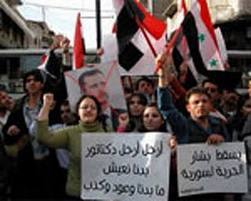 Syrian security forces arrested dozens of people, rights groups said Saturday, after thousands marched in pro-democracy protests in unrest that has posed the gravest challenge to President Bashar al-Assad’s rule.
Syrian security forces arrested dozens of people, rights groups said Saturday, after thousands marched in pro-democracy protests in unrest that has posed the gravest challenge to President Bashar al-Assad’s rule.
The Syrian Observatory for Human Rights named 21 people who it said had been rounded up by Syrian security in the southern city of Deraa, where the unrest first flared two weeks ago, and in Homs to the north of the capital.
“It is assumed their arrests are as a result of the latest protests,” the rights group said in a statement.
“(The group) demands that the Syrian authorities release all detainees of opinion and conscience and stop the practice of arbitrary arrests of political opposition and civil and human rights activists.”
Ammar Qurabi, an activist from the National Organization for Human Rights named 24 others who were arrested in Damascus, Douma and Homs, according to a statement.
Thousands took to the streets in major cities after Friday prayers, defying security forces who fired tear gas and live ammunition and used batons to try and disperse protesters who have dismissed a limited reform gesture by Assad.
He succeeded his father 11 years ago.
Witnesses said security forces killed at least three protesters in the Damascus suburb of Douma Friday, taking over 60 the number of deaths in protests that were inspired by popular uprisings that have swept the Arab world. Qurabi’s statement named five people who were killed in Douma.
The turmoil could have wider repercussions since Syria, bordered by Lebanon, Israel, Turkey, Jordan and Iraq, is in the thick of the Middle East conflict, maintaining an anti-Israel alliance with Iran and supporting militant groups Hamas and Hezbollah.
“VIOLENCE IS NOT THE ANSWER”
The United States, which has designated Syria as a “state sponsor of terrorism” since 1979, and the United Nations, condemned the latest escalation in violence.
“Violence is not the answer to the grievances of the Syrian people,” Jay Carney, spokesman for U.S. President Barack Obama, said in a statement.
An official source said via state news agency SANA that “armed groups” were responsible for the violence in Douma, Homs and Deraa, where unrest came to a head after police detained more than a dozen schoolchildren for scrawling graffiti inspired by popular uprisings in the Arab world.
Speaking for the first time since the unrest began, Assad on Wednesday declined to spell out any reforms, especially the lifting of an emergency law in force since his Baath Party took power in a 1963 coup and that has been used to stifle opposition and justify arbitrary arrest.
Assad later ordered the formation of a panel which will draft anti-terrorism legislation to replace the emergency law, a move critics have dismissed, saying they expected the new legislation would give the state much of the same powers.
Ending emergency law has been a central demand of protesters, who also want political prisoners freed, and to know the fate of tens of thousands who disappeared in the 1980s.
Lawyers and activists have said arbitrary arrests have continued across the country in large numbers since the unrest.
Media operate in Syria under severe restrictions. Syria expelled Reuters’ Damascus correspondent last week. One foreign journalist was released by authorities Friday, three days after he had been detained, while a Syrian Reuters photographer remains missing since Monday.
Two other foreign Reuters journalists were also expelled.
Turkey’s Prime Minister Tayyip Erdogan said he would press Assad to defuse unrest by making reforms when he speaks to him Monday, newspapers reported Saturday.
Photo: protest against the Syrian regime on the day of martyrs on April 1, 2011. One poster reads : “Go Go dictator …we want to live . We don’t want your lies and promises”

Leave a Reply
You must be logged in to post a comment.